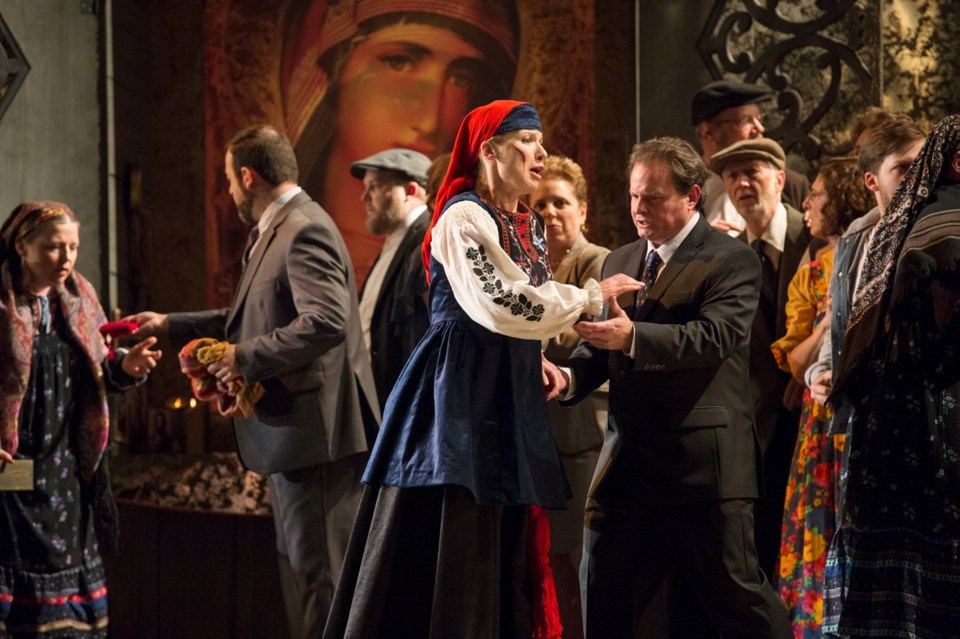REVIEW
What: Jenufa
When: Thursday, 8 p.m. (runs through Oct. 22)
Where: Royal Theatre
Tickets: $25-$165 at rmts.bc.ca, by phone at 250-386-6121, or in person
Rating: Four stars out of five
Riveting drama is at the forefront of Pacific Opera Victoria’s production of Leos Janacek’s Jenufa, rather than individual singers or songs.
But make no mistake, to achieve the emotional depth and connection necessary for the characters, the music has to be effortless and powerful — which it was Thursday night under the direction of maestro Timothy Vernon.
The opera begins with the pulsing tone of a xylophone, both reminiscent of a mill in the small Moravian village (now Czech Republic) where the opera is set and of the repetitive minimalist motifs of modern composers such as Steve Reich.
It’s this play between old and new, traditional and modern values, that drives much of the dramatic tension in this staging of the opera — brilliantly executed by director Atom Egoyan and set and costume designer Debra Hanson.
The cast wears a mixture of old-world and contemporary clothing, embodying a modern rural village where babushkas carry cellphones and teens in jeans might throw some hip-hop moves into a folk dance.
Egoyan is best known for his films, which have garnered two Academy Award nominations and five Cannes Film Festival awards, but he is also an accomplished theatre director. His debut with Pacific Opera Victoria is a labour of love — he’s a big fan of the company — but also a homecoming.
This is his first local production since he graduated from Mount Douglas Secondary School four decades ago. In his program notes, Egoyan thanks his former drama teachers. Coincidentally, a member of the Jenufa chorus is an old classmate.
Egoyan attended opening night with his family, including his mother, Shushan, a longtime local opera supporter. It was hard to tell who had the longer receiving line.
His involvement in the production no doubt brought an added layer of intrigue to the lesser-known opera — at least in these parts.
Janacek based his late 18th-century opera on a play by Gabriela Preissová, which was loosely based on true stories. It features a thicket of familial relationships, assault, infanticide and tragedy in three action-packed acts. Janacek interspersed Moravian folk melodies with sweeping orchestral motifs and opted for prose rather than rhyming couplets — likely to accommodate his technique of speech melody and use of Czech.
The language is rare in opera, but similar to Italian and French, with room for soaring vowels paced with dense consonants.
Jenufa is a stoic, simple village girl caught between a man she loves, who discards her, and another she loathes, who is violently intent on possessing her. Soprano Lara Ciekiewicz is captivating in the title role, a voice of light and strength amid dark subject matter and ravaged emotions. Her performance alone is enough to sustain any casual opera fan through unfamiliar territory.
It is Jenufa’s severe stepmother, Kostelnicka, who wreaks the most havoc on her life, in twisted acts of love, and again, violence.
As Kostelnicka, mezzo-soprano Emilia Boteva is exceptional in building from restraint to boiled-over raw emotion.
Jenufa’s lover, Steva, is played by the fittingly cast tenor John Lindsay, who adds some louty levity and even peels off his shirt in one scene. Other light moments include a colourful scarf dance and the comical interjections of the mayor’s family.
Colin Judson is gripping as the dejected, and eventually accepted, suitor Laca. The tenor’s journey from despicable to repentant is complex and satisfying.
The culmination of the opera appears to be redemptive and hopeful in the last act.
But in a modern context, Jenufa’s resolve to forgive and accept her lot is puzzling, even infuriating.
